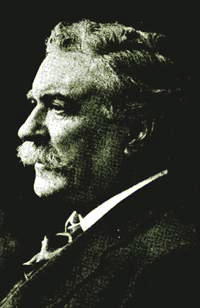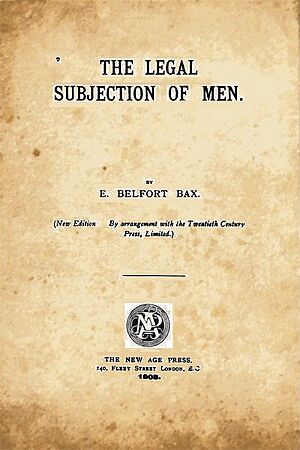Ernest Belfort Bax facts for kids
Quick facts for kids
Ernest Belfort Bax
|
|
|---|---|

Bax, c, 1880
|
|
| Born | 23 July 1854 Leamington Spa, Warwickshire, UK
|
| Died | 26 November 1926 (aged 72) |
| Nationality | British |
| Occupation | Barrister |
| Known for | Men's rights, Socialism |
|
Notable work
|
The Legal Subjection of Men (1896) |
Ernest Belfort Bax (born July 23, 1854 – died November 26, 1926) was an English barrister (a type of lawyer), journalist, philosopher, and historian. He was also known as a men's rights advocate and a socialist.
Contents
About Ernest Belfort Bax
Ernest Belfort Bax was born on July 23, 1854, in Leamington Spa, UK. His father, Daniel Bax, was a rich manufacturer of raincoats. Ernest grew up in a very strict religious home, which he later said left him with "unpleasant memories."
He was taught at home by tutors from 1864 to 1875. During this time, he was influenced by many thinkers like Herbert Spencer and John Stuart Mill. These ideas helped him believe strongly in using logic and reason. When he was 16, he became interested in world events like the Franco-German War and the Paris Commune, which was a short-lived government in Paris.
In his youth, Bax loved music and played the piano. At age 21, he went to Germany to study music. He returned to Germany in 1880 as a journalist. There, he discovered German philosophy, especially the ideas of Immanuel Kant and Georg Wilhelm Friedrich Hegel. Philosophy became a lifelong passion for him.
Bax's Philosophical Ideas
In 1880, at age 26, Bax began studying philosophy in Germany. He focused on the works of Kant and Hegel. In 1883, he translated one of Kant's important books into English. The next year, he wrote his own Handbook to the History of Philosophy.
Bax wrote several other philosophy books. These included The Problem of Reality (1892) and The Roots of Reality (1907). He also wrote Problems of Men, Mind and Morals (1912) and The Real, The Rational, and The Alogical (1920).
Advocating for Men's Rights
Bax strongly believed in the legal rights of men. He felt that men's rights were not as strong as legal rights of women at the time. In 1886, he wrote an article called Some Bourgeois Idols. In it, he argued that women had special advantages under the law. He continued to write about this topic for many years.
In 1896, he wrote a famous book called The Legal Subjection of Men. The title was a response to John Stuart Mill's essay "The Subjection of Women" from 1869. In his book, Bax used his experience as a lawyer to show how laws often favored women over men and boys.
Bax was also an antifeminist. He believed that the feminist movement of his time was not fair to both sexes. He argued that "anti-man crusades" led to laws that were unfair to men. He wrote many articles about how English laws seemed to favor women. He also thought that women's suffrage (the right for women to vote) would make things even more unbalanced. In 1913, he published another book, The Fraud of Feminism, explaining his views.
Bax's concern for men's equality made him interested in socialism. He thought socialism might help fix what he saw as unfair treatment of men in the capitalist system. He believed that socialism could help achieve true equality between sexes by ending special privileges for women.
Bax and Socialism
Bax first learned about socialism in Germany in 1879. He combined socialist ideas with philosophy. He imagined a "religion of socialism" that could replace traditional religion. He was an atheist and wanted to free workers from what he saw as strict middle-class rules.
When he returned to England in 1882, he joined the Social Democratic Federation. But he soon left to help form the Socialist League with William Morris. Later, he rejoined the Social Democratic Federation. He became a main thinker for the party and edited their newspaper, Justice.
Bax believed that the time was right for socialism. However, he felt that a lack of education among the working class was slowing things down. He supported the ideas of Karl Kautsky, another socialist thinker. Bax also supported Britain during World War I, though he was mostly focused on his law career by then.
Bax as a Historian
Besides his work in philosophy, men's rights, and socialism, Bax also wrote many detailed historical studies. He always felt a need to understand history better, even from childhood.
Some of his historical books include: Jean-Paul Marat: The People's Friend (1879), which was about a French Revolution leader. He also wrote about German history, such as German Society at the Close of the Middle Ages (1894) and The Peasants' War in Germany (1899).
Bax's Published Works
Here are some of the books Ernest Belfort Bax wrote:
- Jean-Paul Marat: A Historico-Biographical Sketch (1882)
- A Handbook of the History of Philosophy (1886)
- A Short Account of the Commune of Paris of 1871, with Victor Dave & William Morris (1886)
- Religion of Socialism (1886)
- The Story of The French Revolution (1890)
- Outlooks From a New Standpoint (1891)
- The Problem of Reality (1893)
- The Ethics of Socialism (1893)
- German Society at the Close of The Middle Ages (1894)
- A Short History of The Paris Commune (1894)
- Socialism; Its Growth and Outcome, with William Morris (1894)
- The Legal Subjection of Men (1896)
- The Peasants War in Germany (1899)
- Jean-Paul Marat: The People's Friend (1901)
- The Rise and Fall of the Anabaptists (1900)
- A New Catechism of Socialism, with Harry Quelch (1903)
- Essays in Socialism, New and Old (1906)
- The Roots of Reality (1908)
- The Last Episode of the French Revolution: Being a History of Gracchus Babeuf and the Conspiracy of the Equals (1911)
- Problems of Men, Mind, and Morals (1912)
- The Fraud of Feminism (1913)
- Reminiscences and Reflexions of a mid and late Victorian (1918)
- German Culture Past and Present (1915)
 | Aaron Henry |
 | T. R. M. Howard |
 | Jesse Jackson |


